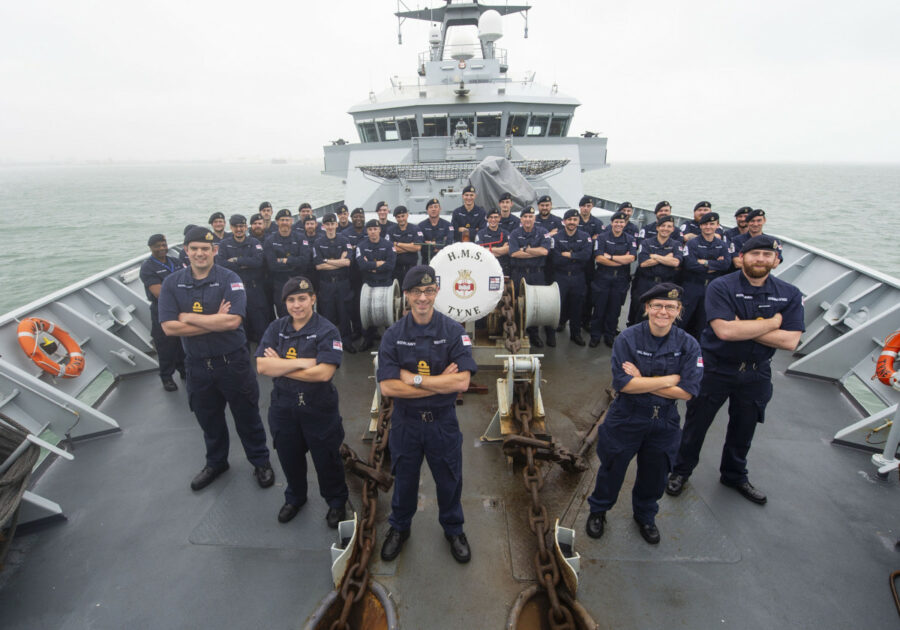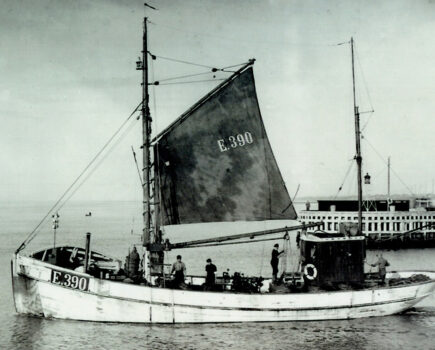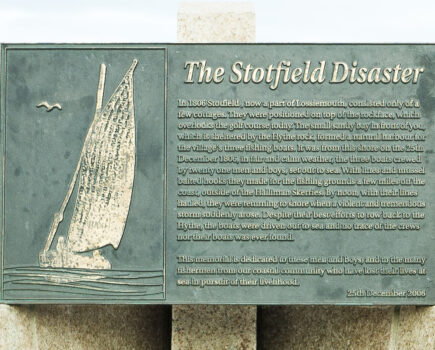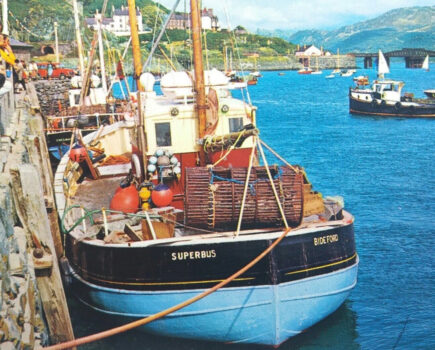The Fishery Protection Squadron’s Squadex exercise, conducted in the Solent earlier this month, offered a chance to talk to the Royal Navy personnel tasked with safeguarding Britain’s fisheries – and to see behind the scenes. John Periam reports (Photos: Geoff Lee)
The Portsmouth-based Fishery Protection Squadron (FPS) undertakes an annual squadron exercise in the Solent. This year, two of the squadron’s offshore patrol vessels (OPVs) took part, including, for the very first time, a Batch 2 River-class OPV, HMS Medway, which was recently commissioned at Chatham Dockyard.
HMS Tyne, a Batch I River-class OPV – the oldest in the fleet – was the other squadron vessel involved.
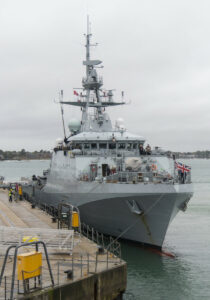
HMS Medway about to leave her berth at HMNB Portsmouth.
With origins that have been traced back to 1379, the FPS is the oldest operational squadron in the Royal Navy. Those who have served in the squadron are very loyal to it, with many requesting to return after other postings.
At a reception held onboard HMS Victory in the evening, Captain Sir Robin Knox-Johnston CBE, representing the first sea lord, said: “Working in partnership with the government, the squadron provides a year-round presence at sea in all weathers to protect the UK’s fisheries, enforce our laws and preserve our fishing grounds for future generations.”
Commander Simon Pressdee, the current commanding officer of the squadron, told Fishing News: “The exercise has been a great success, demonstrating to our affiliates, supporting government agencies and senior military officers what a capable and effective group of people I have across the ships of my squadron, which together makes for a formidable offshore patrol force, both in the UK and overseas.
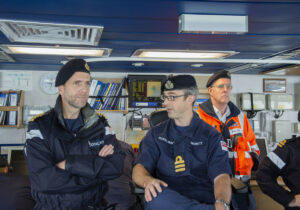
Captain Ken Houlberg discussing plans for the day with Commander Jon Browett.
“Today has provided an opportunity to demonstrate the range of activities that the ships are expected to conduct – from fishery protection duties in support of the Marine Management Organisation (MMO) to supporting maritime counterterrorism, as well as maintaining national security in UK waters – a task which HMS Mersey is conducting today as she escorts a group of Russian vessels that were passing close to the south coast.” HMS Mersey was originally scheduled to take part in the exercise.
Commander Pressdee went on to say: “The squadron continues to evolve from our core tasking in the UK, and we are looking forward to deploying HMS Forth shortly on her mission to the South Atlantic, where she will support the British forces based in the Falkland Islands, replacing HMS Clyde which has been on station for over 12 years – the Royal Navy’s longest deployment!
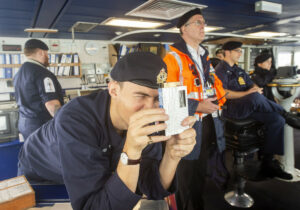
Warfare officer under training SLt Toby Robson using a Stuart’s distance meter to measure the distance to the ship ahead.
“HMS Forth will be the first of her class to deploy and meet the first sea lord’s intention to increase our forward presence, which is a new and exciting role for these much improved, agile and globally deployable ships.”
The Squadex exercise came at an exciting time for the FPS, as the last of the Batch 2 OPVs on order, HMS Spey, was formally named the week previously in Scotstoun, Glasgow.
The squadron’s vessels and crews are at sea longer than any others in the Royal Navy. Currently they do eight months out of 12 away from home, and due to their role are working all the year round.
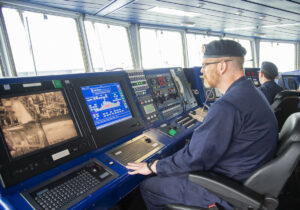
CPO (ET) (ME) Steph Cahill monitoring the ship’s engines from the bridge.
The squadron is based at Portsmouth, and the base comes under the command of Commodore Jeremy Bailey. He said: “It is a delight to have the squadron based here, and its commander likewise. Its vessels are regular visitors to Portsmouth, and we have built up an excellent working relationship. They have become part of the Portsmouth family.”
The FPS is a strong supporter of the Fishermen’s Mission and the Shipwrecked Mariners’ Society. This was endorsed by Commander Simon Pressdee. “Fishing is one of the most dangerous occupations, if not the most dangerous. We see this often when we board vessels. Working single-handed on a small deck, often in inclement weather, to catch, at times, such a small quantity of fish to make a living, must be hard to contend with. Families need supporting, and that is where both these charities, alongside others, come in to help.
“We will always support them, and when time allows if visiting a port, will invite those that support them, along with fishermen, onboard to say our thanks.”
Communication is key
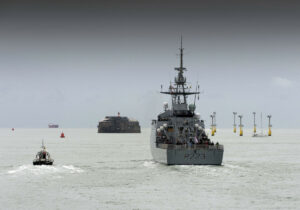
HMS Medway being escorted by a Royal Navy pilot boat through the Solent deepwater channel.
The day gave Fishing News the opportunity to meet several of the crew members and senior officers onboard. One area that is always of particular interest is communications, as this will be the first point of contact with a fishing vessel before any Royal Navy RIB boarding operations can take place.
The Royal Navy RIB crews are considered to be some of the best in the world, and in the process of any boarding are there to help fishermen, should they notice any issues that might affect that vessel’s safety.

ET (ME) Matthew Angove checking the oil level in one of the marine diesel engines.
Harry Perks is one of three specialist communicators onboard, having joined the Navy in 2012. “This is my second posting to the squadron – they are such a small close-knit community, which you don’t see so much on larger vessels. It’s one happy family, with officers included.
“In the communications department, our main job onboard is to make sure the running of all communications links works well. This includes the satellite links and IT administration, including the investigation of any faults that may occur.
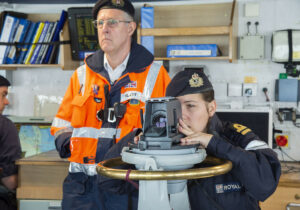
Operations officer Lt Emily Witcher navigating HMS Tyne through the deepwater channel, with the pilot overseeing the operation.
“Take the Squadex exercise that is happening as we speak. We were informed a week ago of all the vessels taking part, and what communications were required, including secure communications. All the channels were set up, and relevant call signs between vessels and working RIBs. Once checked, this was all handed over to the bridge, and we would then be notified of any problems if they occurred. Our communications can be encrypted to enable voice traffic to only be understood by our units.
“HMS Tyne is based on a commercial merchant navy design that has been made into a warship, so a lot of the onboard equipment we have got is similar to that on civilian ships. In comparison to other naval ships, we have a small department which is easy to manage. We of course have links to local Coastguard stations and the maritime communications centre at Fareham, and in the event of any incident at sea, we are able to support subject to the commanding officer’s direction.

LS (Sea) Carl Amas lowering the Pacific 24 RIB from HMS Tyne.
“In the event of a boarding situation from RIB to fishing vessel, we will hail them in advance on VHF to let them know of our intentions, and set up a direct personal link to a selected crew member. In most cases, they are happy, and understand that we are there to help, not hinder.
“UK fisheries, as a whole, are still very active, and when at sea, it is surprising how many small vessels are out there. We cannot always be seen over the horizon, but with the communication equipment onboard, we can hear them at great range. Our role is to protect, and there will always be a need for us!”
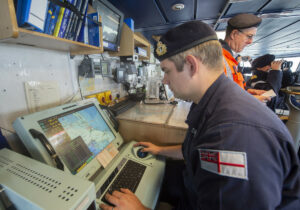
Correspondence officer Lt Joseph Darwell assisting the ship’s departure using the warship electronic chart display information system (WECDIS).
It was obvious that all the crew communicate well with each other, and on a small vessel like this, that plays an important part, both when on and off duty.
This was endorsed by Lt Rebecca Brown, who has been serving for 10 years now, and throughout her career has had strong connections to the squadron. “It offers a great learning curve, and this is something we see every day in our routine activity with new joiners. To be back on HMS Tyne now as the first lieutenant is a real privilege.
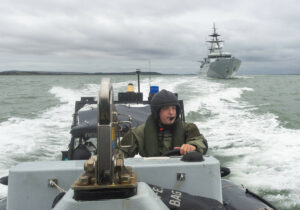
AB (Sea) Iain Barrowman at the helm of a Pacific 24 RIB, with HMS Tyne astern.
“Squadex gives the ships’ companies opportunities to meet each other and work together with other vessels. It is also important to meet fishermen, and at times we go to events linked to fishing communities.
“I am also a marine enforcement boarding officer, and meet fishermen when working onboard. There have been big changes in legislation regarding safety, and when we board, we make a concerted effort to make those there aware of these changes. We are not there to cause issues, but to advise them.
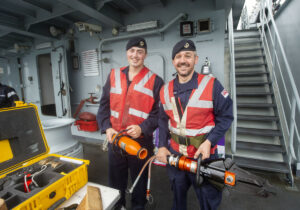
LET (ME) Richard Church and ET (ME) Matthew Wiltshire checking the ship’s firefighting systems and ‘jaws of life’, which are used in damage control.
“Safety onboard our own vessels is top of the list, and our crews are made aware of this at all times. I have noticed that there are now fewer infringements being reported, and that most fishermen are very much onboard with current legislation. We work closely with the MMO, and support each other in many ways.
“We are not there to take away fishermen’s livelihoods; we are there to support and guide them, and what I am seeing is that they are respecting this a lot more now. It is all about sustainability. If, for example, a fisherman reports a potential offence to the MMO direct, the MMO ops room will direct its teams, and if necessary communicate with the Navy ops, and hopefully we can resolve the situation sooner rather than later. Fishermen are dedicated to what they do, and this certainly shows when we board from one of our RIBs.
“A lot of people are unaware of what the Royal Navy does, and most only see highlights from the national media. We are keen to demonstrate the positive nature of what we do in safeguarding UK fishing grounds, and are always keen to visit local ports to show the local fishing communities what we do.”
Diverse tasking
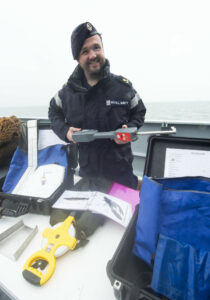
LET (CIS) Harry Perks holding the Omega mesh gauge that is used for checking fishing nets.
Captain Ken Houlberg is in charge of all the Royal Navy’s small ships and diving community. Ships under his command include all the offshore patrol vessels, Hunt-class mine countermeasure vessels, Sandown mine countermeasure vessels, and all the inshore patrol boats.
He said: “I am blessed with four very strong squadron commanders, who do all the detailed work for me as the first point of contact for all those ships. Commander Pressdee has a wealth of Navy experience associated with diving and submariner involvement, and is currently in charge of the Fishery Protection Squadron. We all work well together, and I know that having such supportive commanders takes a lot of pressure off me.
“I have served 33 years in the Royal Navy, and have loved every minute of it. I cut my teeth in the squadron back in the days when the River-class minesweepers were based up in Rosyth – they had a flat-bottomed hull design and were deepwater minesweepers, but were often tasked to support fishery protection. They did roll around a lot, but they offered a fresh experience as they were able to get into ports I had never been into before – nor since.
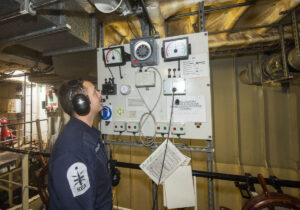
AB (Sea) Iain Barrowman checking the course of HMS Tyne from the secondary steering position.
“I then came back into the squadron in 2003, and was in command of HMS Chiddingfold, and loved it, as a young commanding officer, deciding which area to patrol when you left port. In those days we worked with DEFRA, and our orders were such as, ‘Go patrol the North Sea for us,’ and that was it.”
Captain Houlberg added: “The squadron’s role is diverse and exciting for its people. Those who have not been in it can’t seem to understand what fun we find in boarding fishing vessels in all weathers and going into holds, being thrown about all over the place, whilst we check fish stocks.
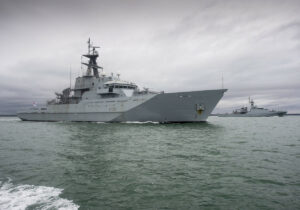
HMS Tyne and HMS Medway in formation in the Solent.
“People in the squadron are conducting roles in the Royal Navy that would be done by a rank one or two above elsewhere in the Navy. The tasking is diverse, and the time at sea is very hard – we do exactly what it says on the tin when it comes to the Royal Navy and the Fishery Protection Squadron. We enjoy it, and then we go back to our families.”
One thing he particularly enjoys is meeting the fishermen. “They are grafters. It is a delight to be part of their industry, and to see just how hard they work to make, at times, a small living.
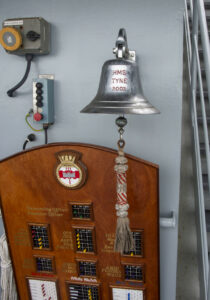
The bell on HMS Tyne.
“It is also important to remember that when we board a vessel, we are there to see that the fishing legislation is adhered to – we are a leading part of the maritime community, and fishermen are very much part of it also. We are all seafarers, and there is that bond between us. We are professionals, and if we see that something is not quite right, we will advise the skipper. However, if we find that things are not corrected, we will take the matter up through the normal channels, with either the MMO or the MCA.
“There are two ways I look at this. Firstly, I am responsible for the safety of our own personnel, and if there is an issue that is unsafe, we will put that right. Secondly, we do care about the safety of fishermen at sea, and we will be the first to go to their aid in any emergency. The industry is possibly the safest it has ever been, but it is the industry that is closest to the elements – one must never lose respect for the sea and the weather, however experienced one may be.”
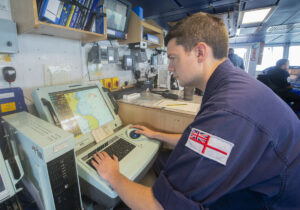
Warfare officer under training SLt Nick Ingledew planning the course back to HMNB Portsmouth.
Fishing News asked Captain Houlberg how he felt the industry had changed. “The constants are the people, and the type of people who wish to spend their career at sea in a small boat facing the wind and the waves – lovely people! The things that have changed are the regulations, and the way that we monitor fishing in our UK waters has changed significantly over the years.
“There used to be far more manual eyeballing, and now it’s far more electronic, linked to databases to record events and through the vessel monitoring system. The whole of the regulatory system is far more automated. I personally think this is a good thing, and every fisherman who works within the rules will want to know that the regulations are there to protect them and their industry.
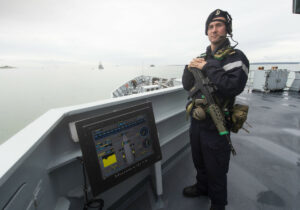
AB (Sea) Lee Bolton providing force protection on HMS Tyne as she leaves Portsmouth.
“We now have a clear picture of the fishing industry, and every fishing vessel that goes to sea in our waters. We understand where they fish and what they fish for, including those who stretch the boundaries of the rules. We visit most fishing vessels quite regularly, and we do get to know them extremely well.
“Our job is to support the sustainment of the industry, and we therefore operate under the direction of the MMO to support the sustainment of fishing stocks, making sure that the rules are followed. I know the senior fishery officer based at Shoreham – he is a super guy, and I have the utmost respect for him and his MMO regional team. He, like some others, cares about the industry – as we do. Communication plays an important part. We know how we each operate, and it works extremely well.
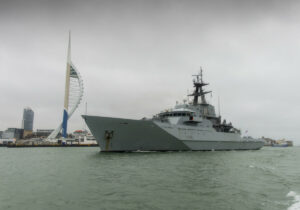
HMS Tyne returning to HMNB Portsmouth.
“There is no doubt that with the addition of the new Batch 2 vessels, the squadron is going through an exciting time. They have the potential to be deployed across the globe, offering our sailors a great opportunity for the future. They are going to offer roles that are going to fascinate many of our youngsters who are the future of the Royal Navy. These men and women spend more time at sea than anyone else, but they enjoy the variety of their tasking.”
Captain Houlberg – who also goes by the name ‘Captain Fish’ – added: “In my case, I am a seafarer, a Viking, and have salt in my veins. My job does still get me to sea, and I visit my ships all over the world.”
Supporting sustainability
Fishing News was onboard HMS Tyne for the duration of the Squadex exercise. Her captain Commander Jon Browett has been in post for 14 months. He said: “We have a really tight ship’s company, and work and live together in all situations on and off shore.
“Squadex gives us an opportunity to get the ships and ships’ companies together at one time. We had hoped for more today, but HMS Mersey was retasked early this morning and had to depart to the English Channel. However, it was nice to have the latest Batch 2 HMS Medway working alongside us. It is also a rare opportunity to catch up with each other with information sharing.
“In planning today, different ships are taking part in different elements. HMS Medway took part in navigational planning right up to the last minute. The weather was not as good as it could have been, so we had to take this into consideration as we left Portsmouth and headed out into the Solent.
“HMS Tyne is the oldest OPV in the squadron, and she is in really good order, having had a full maintenance package done over the summer. This included new RIB boats and davits as well as radars and gyrocompass, and an update to crew accommodation onboard.
“The RIBs play an important part in our everyday activity. These are the Pacific 24 RIBs, which are a lot faster and are able to handle increased sea states. These are our front line when boarding a fishing vessel, and their crews are put through their paces with the MMO when training. We use these seaboats more than the majority of the fleet. Getting people on and off fishing vessels safely is challenging work at times, and they are good at it.”
HMS Tyne has no flight deck. The only current Batch 1 to have one is HMS Clyde, which is based in the Falklands. The new Batch 2 vessels will all have flight decks, which will increase the squadron’s role. The ships are a little bigger and will be faster, with an extra mess deck for visiting personnel, and military capacities that will make them more versatile.
Commander Jon Browett added: “What is nice is that both Batch 1 and 2 will be working alongside each other. Tyne is a very busy vessel, and we are out doing a whole range of tasking. We have a perfect platform for navigational training, and we spend more time than we used to doing national tasking such as vessel escorting, which HMS Mersey has been tasked with today.
“This is a good time to be with the squadron, and we see fishermen working very hard. They are out there maximising their quota stocks, along with vessel efficiency.
“It is a more professional industry due to the regulations. Most vessels we board, we see they are doing their level best to abide by regulations, and there is a real appreciation of the requirements of sustainable fishing, and that is right across the board from the MMO to the individual fisherman. This is one of the reasons we are out there to support their aims.
“The boats that we board have a wide range of crews, including a lot of UK nationals, and some foreign nationals who come in to work. There are some areas around the UK where there is still a local sustainable fishing community committed to carrying on their traditions. There are other areas where tradition is less prevalent – getting people to sea is not easy, especially for youngsters in the fishing industry. We have the same in the Royal Navy – it is an ongoing task to get new recruits.
“It is the Royal Navy’s role to make people feel welcome, and that is why the squadron makes a concerted effort to do just that. We meet fishermen, visit ports when we can, and like today, have welcomed Fishing News onboard so you can explain in more detail what we do to protect your readers’ interests.
“The UK has an island heritage, and the Navy has played an important part in this. Fishing, likewise, plays a key role in keeping many small communities alive, and today has shown just how the Fishery Protection Squadron is there to support and protect our hardworking fishermen.”

